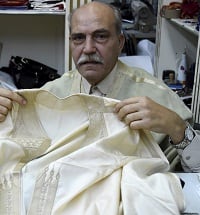Ethical business practices local craftsmanship boost Tunisian fashion trade while the rest of the world is embracing fast fashion trends, Tunisian designers like Mechri are opting for environmentally conscious materials, reports Associated Press.
They are ‘upcycling’ old or unwanted materials and incorporating high-quality fabrics into them. For instance, Mechri refurbishes old fabrics with local materials from Tataouine embroiderers. The designer says, fashion is an intelligent way to pay homage to local materials.
Hassen Ben Ayech, a 26-year-old former computer scientist, also values the importance of paying homage to one’s ancestry. Founder of the fledgling high-end brand Bardo, the designer aims to revive Tunisia’s heritage and traditional crafts to end the slow death of its culture in the face of globalization. The brand’s first collection is inspired by the famous Bardo palace and the rulers in the Tunisian monarchy that was abolished in 1957.
Weaving stories through organic materials
To expand the scale of sustainable fashion in Tunisia, Riad Trabelsi relaunched his French-Tunisian brand Basscoutur in 2018. The brand’s designs reflectEthical business practices local craftsmanship boost Tunisian fashion the complexity of modern Tunisian diaspora and see the sustainability concept become normative in the country. The brand has a growing client base in Japan and South Korea and plans to launch in Italy soon.
According to Sofia Guellaty, Founder, Mille World, an online platform spotlighting Arab youth culture, arts and fashion, Tunisian brands are using the concept of storytelling to make their garments stand out from the rest of the crowd. They are focusing on natural shapes and organic materials that are currently in demand in the international and local markets.
Flourishing textile trade to boost prospects
Though most Tunisian brands are not so eco-conscious, younger consumers are embracing sustainability to preserve their cultural identities. Tunisia has a flourishing textile industry which boosts businesses affected by the current pandemic. Balancing ethical industrial practices with community-driven craftmanship will reassure Tunisia of a better future.




















